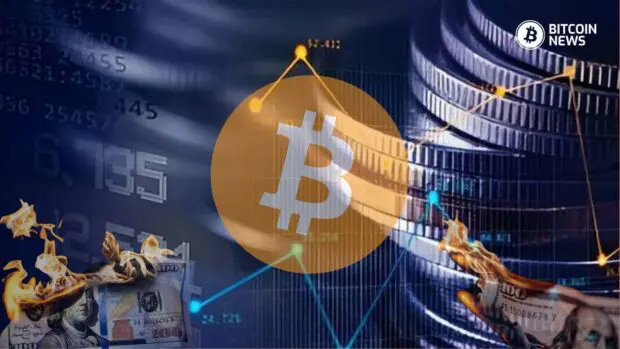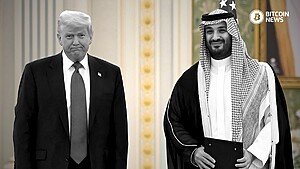Imagine being told as a child that “Magic Internet Money” could one day challenge the mighty dollar to become the next global reserve currency. It would have sounded like pure fantasy. Fast forward to today, and while the idea may still seem far-fetched to some, the landscape of global finance is undergoing a seismic shift.
At the heart of this revolution is Bitcoin. Not merely another digital asset turned meme that degenerates are trying to pump and dump on each other, but a pioneering force that is reshaping the foundational principles of trust upon which fiat currencies have traditionally been anchored. Bitcoin’s resolution of the Byzantine Generals’ Problem, ensuring secure peer-to-peer transactions without double-spending, marks a significant leap in the digital realm. It is the literal discovery of digital scarcity.
As central banks worldwide engage in rampant money printing, they inadvertently dilute the value of fiat currencies, undermining public confidence. This monetary inflation, far from serving the common good, tends to benefit a select group of kleptocrats, prompting a widespread quest for a more stable and trustworthy alternative.
Bitcoin, with its decentralized nature, offers a promising solution. Operating independently of conventional financial systems and immune to political interference, Bitcoin emerges as a beacon of stability in a sea of currency volatility.
The Problem with Fiat Currency
In a world dominated by central monetary authorities such as the Bank for International Settlements (B.I.S), the International Monetary Fund (IMF), the Federal Reserve, and their lesser counterparts, the value of fiat currency teeters on the whims of government edicts and the purported wisdom of these institutions.
Yet, this trust wanes as these ‘economic jesters,’ often overconfident in their financial acumen (does anyone else remember when inflation was supposedly transitory?), recklessly inflate the money supply, triggering inflation and economic turbulence. The spectacle of fiat currency’s unchecked expansion has spurred a desperate quest for an alternative financial mechanism — one not precariously balanced on the slender thread of institutional trust.
The precarious reliance on fiat currency has also misguided the allocation of monetary premium to tangible assets like real estate, distorting their intrinsic value and utility. This misdirection funnels wealth into speculative bubbles rather than fostering genuine economic growth or innovation. Real estate and other commodities become pawns in a grander game of financial speculation, overshadowing the significance of those who contribute actual value through production and services.
This distortion not only skews the market dynamics but also undermines the essence of what these assets are meant to represent: stable, productive investments in the physical world. The fallout from such speculative frenzy is a landscape where the producers, the real bedrock of economic value, are often overshadowed by the transient allure of speculative gains, leading to a skewed economy where paper wealth trumps real-world productivity and sustainability.

Magic Internet Money and Trustless Protocols
It’s wild to think Bitcoin might become the heavyweight champ of global finance. Yet, here we are in 2024 and the spot Bitcoin ETFs have been setting records on Wall Street and offering a lifeline to our debt-drowned system. It is good to see something slap some sense into a collateral-starved financial system. And why? Because the bigwigs running our money show have been playing Jenga with our economy, stacking debts higher than a skyscraper, leaving us hanging on the brink.
Some will undoubtedly oppose this. Bitcoin Derangement Syndrome (BDS) is becoming more entrenched than Trump Derangement Syndrome (TDS) for those who have been vehemently predicting its demise since bitcoin’s fiat prices were in the single and double digits, such as Peter Schiff.
Despite the skeptics, Bitcoin is captivating a diverse audience, from everyday individuals to industry giants and even sovereign nations, establishing itself as the vanguard of a novel financial era. It transcends mere currency status, heralding the advent of a transparent, immutable, and equitable financial infrastructure. This shift is steering us away from the perilous ‘maximum leverage’ philosophy, towards a more secure, decentralized global economy.
Conclusion
The transition to a Bitcoin-dominated global financial system is an ambitious undertaking, fraught with challenges like volatility, regulatory hurdles, and the digital divide. However, as traditional fiat currencies continue to reveal their vulnerabilities to mismanagement and erosion of public trust, the compelling case for Bitcoin grows stronger.
At its core, Bitcoin represents a paradigm shift towards a more transparent, immutable, and equitable financial infrastructure. It transcends being merely a currency, embodying the pursuit of a monetary system built on decentralized trust rather than institutional authority. As disillusionment with traditional finance mounts, propelled by rampant money printing and economic instability, the allure of “magic internet money” gains credibility.
While the path ahead is uncharted, the prospect of Bitcoin ascending as the next global reserve currency offers a compelling glimpse into a future where digital scarcity and trustless protocols redefine the very foundations of economic stability. As this financial revolution unfolds, embracing Bitcoin could herald a new era of monetary sovereignty and resilience in an increasingly volatile global landscape.
Read more on the subject:










